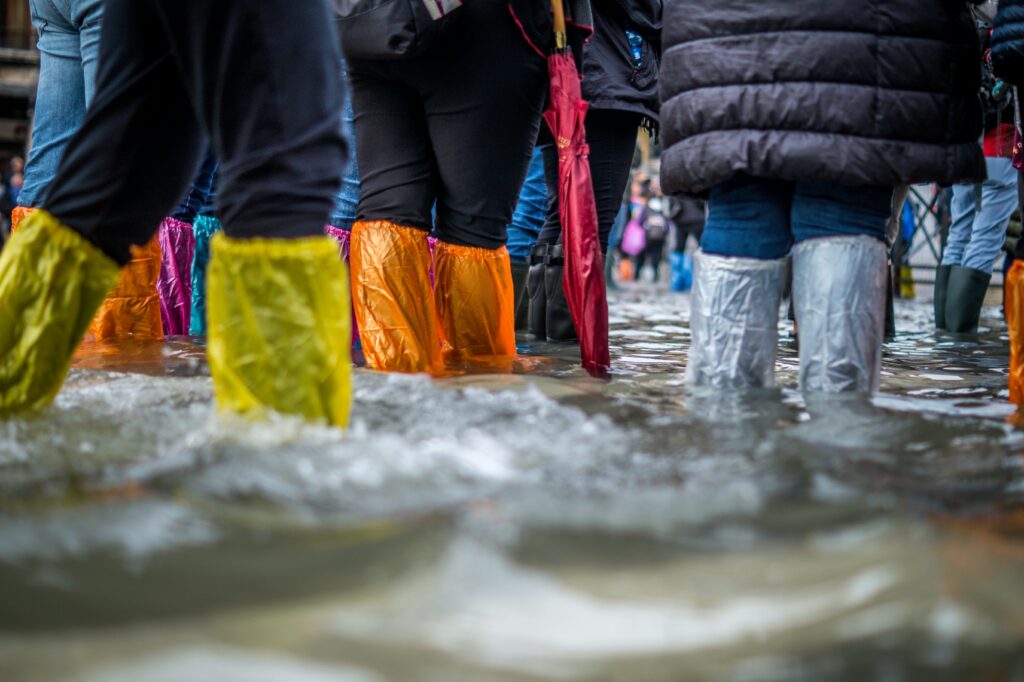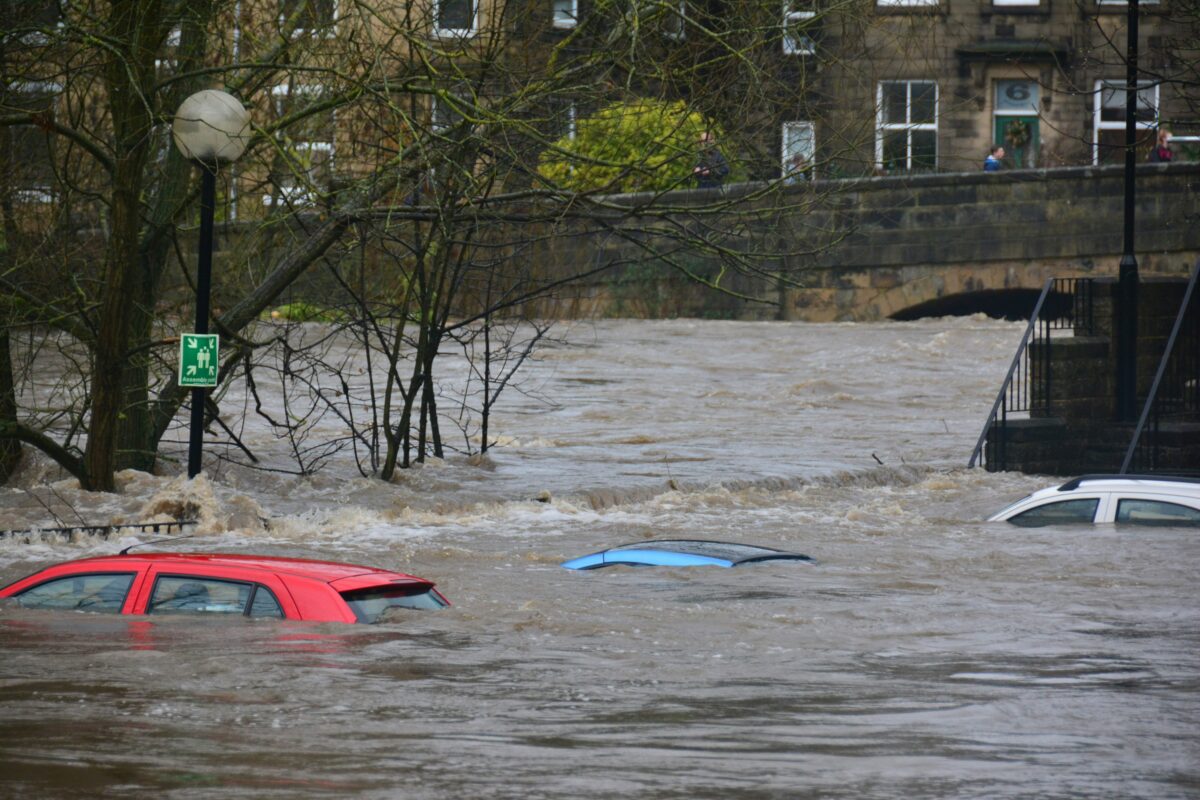Awakening is a fictional account of the River Clyde bursting its banks, written by Mairi Macleod and funded through a SCCAN mini grant.
The day the city drowned, the trees cried the last of their leaves. They fluttered and fell and pooled together in the drains, leaving carcasses swaying in the morning wind. The birds sang a tired song that disappeared in the swollen darkness of the clouds. It was mid-November, teetering on the edge of winter. And the river was rising.
The woman woke groggily in a Malbec-tinged haze and opened the curtains. Rain. It was just before eight, and the white glow of the streetlights fell on her like a spotlight. She missed the orange of the old streetlights, how they wrapped the city in a warm embrace. She missed a lot about how the city had been before. Before what exactly, she wasn’t sure. Just before.
Her sister would be bringing her nephew in the afternoon, driving through from Edinburgh, as she did every third Saturday. The woman would take the toddler on her lap, and wipe snot from his nose like he was hers. Everything would be good, and normal, and okay.
The tap was drip, drip, dripping in the kitchen. She turned it tightly to stop it. The rain outside though, determined, kept on. She turned on the television as she always did. The familiar tone sounded signalling the hour. The presenters were sitting on the red sofa as they always were.
“Residents in Glasgow are being evacuated from their homes as the River Clyde threatens to burst its banks as unprecedented rains continue. Our Scotland correspondent is in Glasgow to give us the latest.”
She darted back to the window. The rain was falling like normal rain, she thought. There was no one around, but that too was normal. It was early on a Saturday morning. The city was having a well-earned lie in. In the Friday post-work relaxation, she had let her phone battery slip down to black nothingness. She wasn’t one to sleep with her phone charging by her side in bed. People rarely needed her.
The kettle hissed in the kitchen as the device came back to life. Then, a peculiar loud beeping sound.
An alert.
EMERGENCY FLOOD WARNING FOR RIVER CLYDE
PLEASE COOPERATE WITH ALL EMERGENCY SERVICES
YOU MUST EVACUATE YOUR HOME IF INSTRUCTED TO DO SO
Then messages, from her sister.
OMG!
Do you know what to do?
Hello??????
She typed:
I’m fine. Talk soon. Xx
The woman was almost certain that a fuss was being made over nothing. People were overdramatic these days. The Clyde didn’t flood, not badly. Not in the middle of the city anyway. And if it did, she was sure she’d be fine. She always was.

She, like everyone else, had seen bad flooding on the news a lot over the years. It happened in England, sometimes. She tried to remember the faraway countries that had been affected by flooding, but she couldn’t name one. All she could recall were the faces. Faceless faces. Black. Brown. Rarely white. They sat on rooftops awaiting rescue, their lives and memories swept away. A news helicopter would hover in the sky above them like a vulture, its blades turning wildly at of the display of human suffering. She had pitied those people, in the way she pitied homeless people on the street. Fleetingly, superficially. Yes, she had donated once or twice to crisis appeals but on the whole her concern sank away with the image on the screen.
The mundaneness of the morning kept on, and she sat there in the living room. The rain drip, drip, dripped down her windows. If it was serious, she’d have heard sirens. Someone would have knocked on her door. But nothing came. No one came. Except sleep.
Voices. Words she cannot understand. Screaming. Crying. And singing. A vengeful song, being sung by the river. She tries to make out a word or a melody, but she can’t. They do not belong to her.
She is standing down by the river in the city centre. Water has engulfed the banks, and risen to her knees.
In the dirty murkiness of the water, she sees them. Hands. Legs. Eyes. They are blurry, difficult to distinguish. Who they belong to she doesn’t know. But the longer she looks, the more they take corporeal form. Solemn faces look back at her from the water’s surface, their gaze penetrating each chamber of her soul. She sees a woman holding a lifeless child at her bosom. She is younger than her, with deep-brown skin that matches her eyes. She looks into those eyes, until they become her own. Until the child becomes her nephew and his tiny hands are clinging to her neck, his red hair damp.
A pained cry cuts through the torrent of noise. Cuts through her flesh. The cry of kin. She turns to see her sister standing on top of a bench, reaching her arms out towards her. Begging for her son. The tears drip, drip, dripping down her cheeks.
The woman uses all her strength to wade through the water. Her nephew shouts for his mother, a little shout that holds the weight of the world. But just as the woman gets within reach of her sister, the furious current comes for them.
The pair are swept away downstream. Water engulfs the woman’s lungs, and she loses grip on the child. What air she has left is seized by the raw, primal scream of a mother.
She is awoken by the frenzied rotation of helicopter blades circling above. She smells it before she sees it, as though the stench has followed her through her dreams. Dirty water. In the hall she sees that it is seeping in beneath her front door. On her phone, an incoming video call from her sister. She accepts, and a perfect image of her nephew flashes on the screen: innocent and buoyant.
The featured image for this blog post is a photograph by Chris Gallagher at Unsplash

